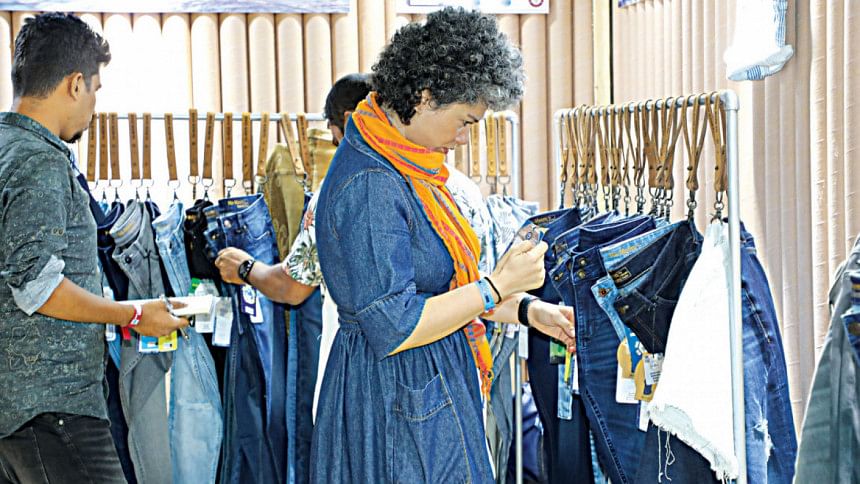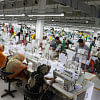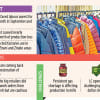Bangladesh to remain RMG hotspot in future, buyers say

Bangladesh will remain as the preferred sourcing destination for readymade garment (RMG) items well into the future as the country has substantially improved production facilities and on compliance with regulations over the last few years, said international clothing retailers and brands yesterday.
Since the Rana Plaza building collapse in April 2013, Bangladesh's workplace safety and compliance with regulations improved a lot, said the foreign buyers.
As a result, retailers and brands are coming over with an increased volume of work orders, especially with improvements in the Covid-19 situation, as the local apparel sector has also proved its strength.
"Bangladesh is the most important sourcing destination for our company," said Ziaur Rahman, Swedish retail giant H&M's regional head for Bangladesh, Pakistan and Ethiopia, on the sidelines of the 12th Bangladesh Denim Expo in Dhaka.
"Bangladesh is a very important market for us. We will stay here," he said, adding that currently his company was sourcing apparel items from 300 garment factories.
"Bangladesh is in the right direction in terms of workplace safety, compliance and product diversification. It is possible to export $100 billion garment items in the next 10 years," said Rahman.
Even five years ago, Bangladesh was in a quite different situation. But now the country has improved a lot, he said, adding that he would increase the volume of items sourced from here by 11 per cent in the next five years.
Bangladesh has the flexibility, is more mature and innovative, has more green garment factories and there are products available, he added.
Similarly, Shafiur Rahman, regional operations manager of Dutch designer clothing company G-Star, said his company sources garment items worth $70 million per year from Bangladesh and of it, 75 per cent was knitwear items.
But recently his company diversified into sourcing non-knitwear items like denim products, he said.
His company would increase the amount of items sourced from here, taking the value to $90 million, in the next three years, registering a 30 per cent growth.
"We cannot even think of sourcing apparel items without Bangladesh," he said.
Alice Tonello, owner of Italian garment machinery manufacturer and supplier Tonello, said her company has been supplying machinery in Bangladesh over the last 28 years.
So far, her company supplied 1,500 textile and garment production and washing machineries to Bangladeshi garment factories.
"Bangladesh is the most important market for us. The demand for our machinery in Bangladesh has been growing a lot every year. Absolutely, the garment sector will continue to grow in the future as well," said Tonello, representing the second generation of the family business.
Yilmaz Demir, regional sales manager for Asia of Turkish company Bossa, said his company sells about one million yards of denim fabrics worth €5 million in Bangladesh a year.
"I have been supplying denim fabrics over the last 16 years. I am looking after business in Bangladesh for many years. Bangladesh is doing good as the factories improved production facilities," he said.
"But the prices of raw materials have increased a lot after the Covid pandemic. Bangladesh is the best," he said.
But changes in the Generalised System of Preferences for Bangladesh may be an issue for the country in the future, he added.
Rashid Iqbal, executive director of Pakistan-based denim fabrics manufacturer Naveena Export, said his company has a lot of confidence in Bangladesh because of the country's improvements in compliance with regulations.
His company ships 5 lakh metres of denim fabrics worth $1.7 million to Bangladesh in a month. He has an office in Dhaka and has been supplying denim fabrics to Bangladeshi partners over the last 15 years.
"Bangladesh is a very strong market for us," said Rashid.
Dolly Thay, managing director of buying house Cloths "R" Us, said work orders were shifting from China, Vietnam, Sri Lanka, Myanmar and Sri Lanka as Bangladesh has grown a lot with respect to its capacity over the last few decades.
However, the profit margin from the export of garment items is still very low, she said.
"Bangladesh should be proud of what has been achieved. Bangladesh has made huge strides towards a more sustainable garment sector," said Anne Van Leeuwen, ambassador of the Netherlands to Bangladesh.
"I often challenge people to give me another example of a sector that has turned around the image and its degree of compliance in such a short amount of time. I never get a serious reply," he said.
"But let's also not be complacent. Challenges remain. Garment workers in Bangladesh today are affected by the way sourcing takes place in Bangladesh," said Leeuwen.
"And given the scale of the industry in Bangladesh, there is plenty of work to be done in decreasing the sector's environmental impact," he added.
Mostafiz Uddin, founder of Bangladesh Denim Expo, said some 85 companies came to showcase their products, of which 30 were local and the rest foreign ones from 39 countries.
"The response from the participants is beyond my imagination," he said, adding that after a gap of two years for the Covid-19 pandemic, it was the most successful denim expo yet in the country.
The event will come to an end today, he said.

 For all latest news, follow The Daily Star's Google News channel.
For all latest news, follow The Daily Star's Google News channel. 








Comments